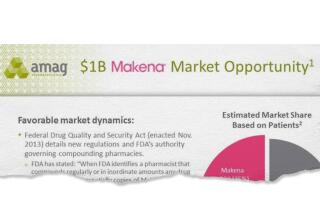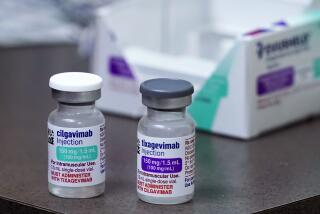Liver Deaths Prompt Restrictions on Popular Antibiotic
- Share via
WASHINGTON — The Food and Drug Administration said Wednesday that it curtailed sharply the uses of a popular new antibiotic after six people taking the drug unexpectedly died of liver failure.
The drug, Trovan, made by Pfizer Inc. of New York, has been prescribed for an estimated 2.5 million people since it was introduced in February 1998, for everything from minor skin infections to complicated post-surgical abdominal infections and hospital-acquired pneumonia, both of which can be deadly.
Its use now will be restricted to life-threatening infections and only in hospital or other inpatient settings, such as long-term nursing homes, the agency said.
Premarket studies in 7,000 patients showed no sign of liver damage. But since Trovan hit the market, there have been at least 140 reports of liver problems associated with its use, the FDA said, making it the latest in a cluster of drugs found to pose risks to the liver.
Others have included Rezulin, a diabetes medication; Tasmar, a drug used in the treatment of Parkinson’s disease and the pain reliever Duract, which was removed from the market.
The liver is a frequent and predictable target for drug toxicity, since the organ’s primary function is to rid the body of wastes and chemicals, including drugs.
“The risk-benefit ratio of this drug has changed” since its licensing, said Dr. Murray M. Lumpkin, deputy director of the FDA’s center for drug evaluation and research. “We want to be sure that the patient who needs this drug can get it but we don’t want people to think they can go down to their neighborhood pharmacy and get it.”
The company said that it would comply with the FDA’s order but stressed that studies showed the drug had saved more lives than other antibiotics with which it was compared.
The company also complained about FDA reliance on the nationwide system that collects information about drug reactions. “The system is helpful in identifying rare adverse events, but data derived from these reports cannot be used exclusively to draw conclusions about a product’s risk-benefit profile,” said Dr. Joe Feczko, a senior vice president of Pfizer.
“We have a difference of opinion with the agency over the interpretation of these data and the regulatory action being taken,” he said, adding that the company believes more scientific evaluation is needed.
The FDA decided against removing the drug from the market because it regards Trovan as valuable for certain potentially life-threatening infections that do not respond as well to other drugs.
In an era when bacterial resistance to many antibiotics is a growing public health threat, there has been an increasing clamor for new, effective antibiotics, particularly those regarded as effective against many different strains of bacteria--and especially against microbes that do not respond to other drugs.
Trovan is particularly effective in fighting a group of germs called “anaerobes”--which live without oxygen and can flourish in colonic and abdominal infections, especially after gunshot wounds, Lumpkin said.
“The FDA does not wish to deprive patients of a drug they really need and we think it is important to have as many kinds of antibiotics available as possible, as long as we can manage the risks associated with them,” he added.
The FDA said that it knew of 14 cases of acute liver failure, regarded as the most extreme situation, that were “strongly associated with the drug.” Six of these patients died of liver failure--one after receiving a liver transplant. Three other patients received liver transplants, another three recovered without needing transplants and “the final outcome is still pending” for the other two, the FDA said.
Last July, after reports of less serious liver toxicity were seen, the FDA strengthened the product’s labeling, warning of potential liver problems.
More to Read
Sign up for Essential California
The most important California stories and recommendations in your inbox every morning.
You may occasionally receive promotional content from the Los Angeles Times.













